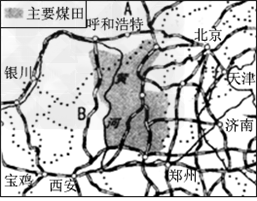问题
综合
读“我国局部地区图”,回答问题。

A.京津唐
B.沪宁杭
C.辽中南
D.珠江三角洲
(2)不合理的土地利用(如滥垦、滥伐、过度放牧)在湿润、半湿润地区容易造成水土流失,在半干旱、干旱地区容易造成荒漠化。图幅内黄河流经地区的A、B两大高原的生态环境问题中,重点需要解决水土流失问题的主要是____________高原,重点需要解决荒漠化问题的主要是_____________高原。
答案
(1)山西;发电(或电力);A
(2)B;A
